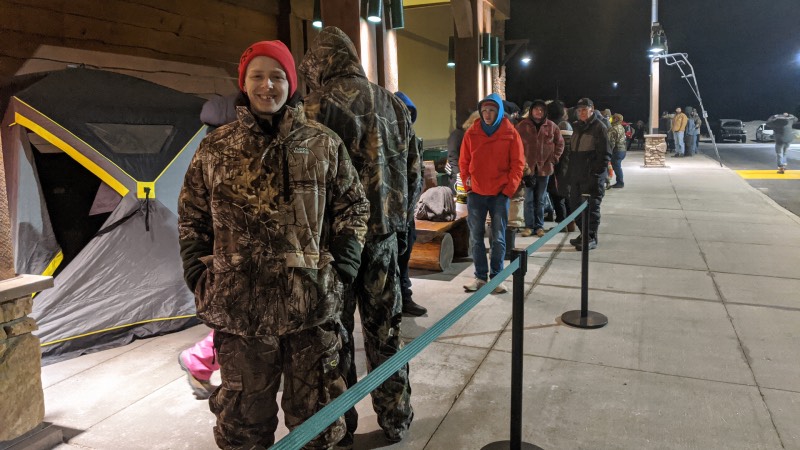Raging against Black Friday madness

Brendon Kelly stands proudly at the front of the line at Cabela’s in Kanata, ready for the Black Friday deals coming his way in five minutes. Photo by Hannah Rivkin.
At 5:45 a.m on Friday Nov. 29, Brendon Kelly was at the front of a 100 metre lineup that snaked around the block.
The 22-year-old Brockville resident arrived at Cabela’s in Kanata at 1 a.m., five hours before doors opened at the outdoor supply store, to secure his place in line for the Black Friday sales event.
The lineup @cabelascanada was VERY long at 5:45 a.m. this morning! Happy shopping dedicated Cabela's fans! @Yowpublication and I will be thinking critically about Black Friday today! Look for my piece later today! pic.twitter.com/K6uOQnBk4S
— hannah rivkin (@hannahrivykins) November 29, 2019
The Cabela’s regular said he isn’t worried about overspending, despite the allure of Black Friday deals. His strategy is simple: Walk in with “a pretty good list,” and stick to it.
At the top of his list: a new sleeping bag.
This young Canadian may be sticking to his shopping list but, according to a 2019 report by Statistics Canada, not many Canadians do.
The report revealed that household debt to income ratio has been steadily increasing in Canada over the past decade. Since 2007, the ratio has risen by 20 per cent.
On one of the biggest shopping days of the year, when retailers slash prices and heavily advertise, Canadians are even more prone to spend. According to the Retail Council of Canada, Canadians spent an average of $824 on holiday expenses last year.
A budget, a vision and climate awareness: A new Black Friday to-do list
Some organizations, like cosmetic company Deciem, are skipping the Black Friday folly entirely.
The Canadian beauty company offered a store-wide 23 per cent discount for every day of November except one: Black Friday. On Black Friday, Deciem’s site will go dark for 24 hours. It’s their way of appealing to their woke customer base.
Canadian consumers are jumping on board as well.
For Anastasia Smolentseva, a 31-year-old communications advisor in Ottawa, her biggest concern about Black Friday is hyper consumerism.
“A shiny day, to get a bunch of shiny things, that we don’t need at all,” said Smolentseva, although she said she’s aware that there are families that use this day to purchase items they may not be able to afford otherwise.
For her, hyper consumerism impacts not just personal finances but also the environment.
Smolentseva said that to combat climate change, consumers need to make changes on a personal level and move away from trends such as fast fashion, a term that describes rapidly produced, mass-market clothing.
“When you ask a government to do something, it takes a long time. And I think it’s important to look at yourselves, and look at what you’re doing,” said Smolentseva.
#BlackFriday is coming up and it’s tempting to go out & buy a ton of STUFF.
— Anastasia Smolentseva, MComm (@anastasia_smol) November 24, 2019
Consider a few things:
- how will the purchases impact your financial goals
- if you are trying to fight #ClimateChange alongside @GretaThunberg, consider impact on the #environment
A golden era for consumers?
“I don’t think there’s a moment in history where consumers have been as empowered as they are today,” said Michael Mulvey, a professor and researcher in marketing and consumer behaviour at the University of Ottawa’s Telfer School of Management.
Despite this new empowered age, Mulvey said that many consumer trends come in cycles, including the latest push for environmentally conscious consumerism.
As an example of such patterns, Mulvey pointed to the dramatic 2011 anti-consumerist “occupy” movement.
People were protesting economic inequality, camping out in major cities and raging against big business.
This greatly resembles the bleed over of environmental consciousness into Black Friday woes, and more generally, consumerism habits, such as those suggested by Smolentseva.
Consumers may be more empowered, but Mulvey thinks there is still a discrepancy between the life a person may want, and the life the person can afford, perhaps accounting for the climbing Canadian debt.
Mulvey offered a personal analogy: “I want to be a good parent. Part of being a good parent is having a good holiday. When you start going through that list of all the things that go into fulfilling that goal, it’s hard to say no sometimes.”
Advice from a Canadian not-for-profit
“It’s so much easier to get into debt than it is to climb out,” said Stacy Yanchuk Oleksy, the director of education and community awareness at the Credit Counselling Society.
The Credit Counselling Society is a not-for-profit organization, which provides free credit counselling and education to Canadians.
Most of all, “Canadians tend to suffer silently about their debt,” said Yanchuk Olesky.
“People feel a sense of shame, so they don’t ask questions, they don’t speak up, and they don’t seek help,” she said.
“When people do speak up, they can walk away from a session with information and a plan for how to start managing their spending.”
Yanchuk Olesky has some advice for consumers looking to sensibly shop on Black Friday:
- Be intentional with their money; what are you shopping for?
- Make a list.
- Use the list, stick to the list – what Yanchuk Oleksy calls “work the list”, cross out items, and don’t add more.
- Bring cash instead of credit cards – Yanchuk Olesky said research has shown that people are apt to spend more when they use credit.
- Be wary of financing options offered by stores – frequently the interest adds an extra layer of cost that consumers wouldn’t have paid otherwise.
- Read the fine print if consumers are thinking of financing.
No fear in the Glebe
Local businesses appeal to their customers on Black Friday.
Ready to roll: e-scooters coming to Ottawa
The Ontario government announced a five-year pilot plan for e-scooters on Wednesday. What will it mean for Ottawa pedestrians?
The More You Woe News Briefs
Keeping you informed on updates to your Ottawa woes





